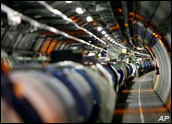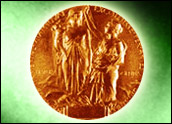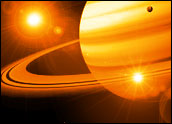
They’ve said it before, and they’ll say it again: A powerful atom smasher set to fire up Wednesday will not destroy the universe. Scientists with knowledge of the machine — dubbed the “Large Hadron Collider,” or LHC — are quickly growing weary of the hype.
The LHC, a giant apparatus 330 feet below the ground of the France-Switzerland border, has taken its share of flak over the past months. The collider works by smashing tiny particles called “hadrons” together at higher speeds than ever before possible. Because of uncertainty about its potential findings, a handful of non-scientists have started talk that the LHC could create a black hole that would swallow up the Earth — something the scientific community insists is impossible and inane.
Finding the Unknown
The collider “is basically hunting for new subatomic particles, a couple of which are predicted to exist and some of which are speculated to exist,” W. Nielsen Brandt, a Pennsylvania State University astronomy and astrophysics professor who closely studies the LHC, told TechNewsWorld.
One of those, known as the “Higgs particle,” has long been sought by scientists. The hope is that the high speed at which the LHC smashes particles might allow it to be seen for the first time.
“What’s found or not found will be extremely illuminating in terms of our physical theories about how the universe works,” Brandt said.
Delayed Gratification
This experiment won’t likely deliver instant results. It’ll take a full year for the collider to reach its maximum energy potential. Once that happens, though, our notion of the universe around us could significantly change. Specifically, we could uncover new details about the forces of nature and the inner structure of matter, or even find new dimensions of space. The possibilities are endless.
“Every time in the past when we’ve pushed off the energy frontier in these particle accelerators, we’ve found new exciting physics — new subatomic particles that told us exciting things about the universe,” Brandt explained.
Hawking’s Hesitation
At least one known great in the science community has his doubts, though. Stephen Hawking told BBC Radio he’d bet US$100 that the LHC won’t find that tiny Higgs particle. While Hawking said the LHC’s conditions should theoretically allow it to be discovered, he said it’d be “much more exciting” if it didn’t — leading to his wager.
As for the wavering questions about the collider’s safety, scientists are quick to dismiss rumors of an imminent end to life as we know it. The notion first came up when a group of critics filed a lawsuit to stop the LHC this past June. The lawsuit, however, was shot down as rapidly as it had risen.
Here’s the real deal: There is a very small chance, scientists say, that the LHC could theoretically create a black hole. Even on that off-chance, though, the hole would be too small and short-lasting to pose any actual danger. What’s more, the collider isn’t doing anything that’s not already happening in nature; it’s just doing it in a more controlled and observable environment. In effect, then, if what the LHC is doing would end the Earth, the Earth would have been ended ages ago by Mother Nature.
“There are multiple layers of safety,” Steve Giddings, professor of physics at UC Santa Barbara, told TechNewsWorld. “It’s been a little bit surprising — this has all been played up more than is justified,” he commented.
Fittingly, almost any scientist you ask will tell you the same thing: There is absolutely no reason to prepare for a doomsday (unless, of course, that’s just your idea of a nice afternoon).
“Almost all of my coworkers won’t even take that possibility seriously, because it’s just not realistic from what we know from basic quantum mechanics,” Giddings pointed out.





















































